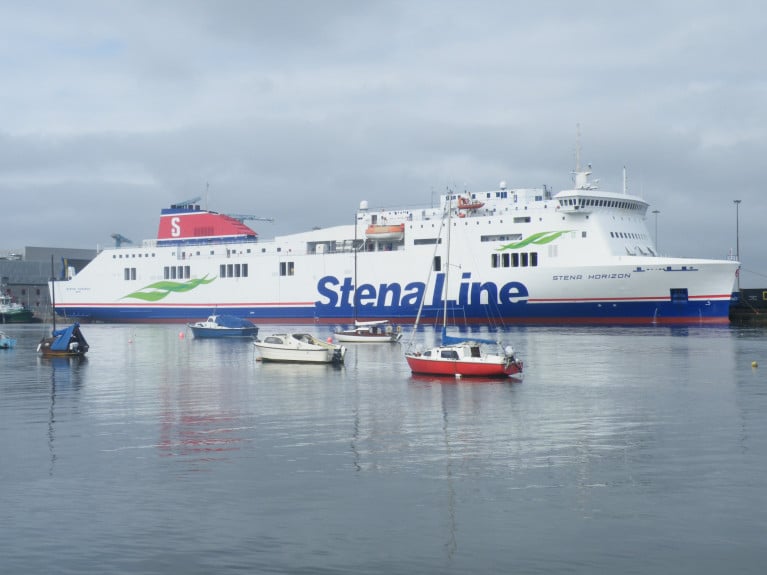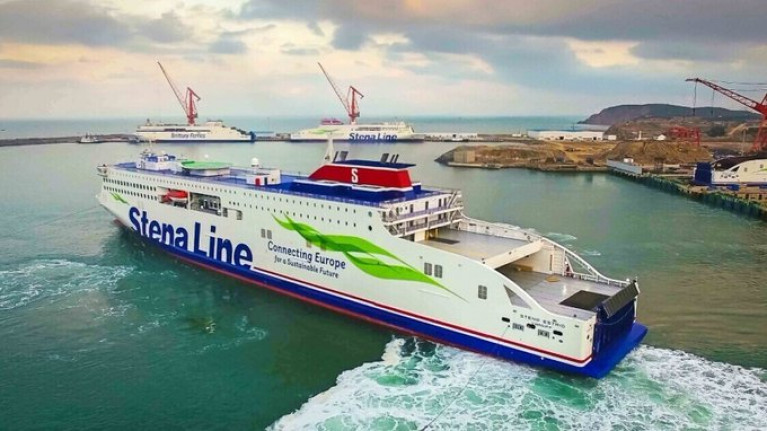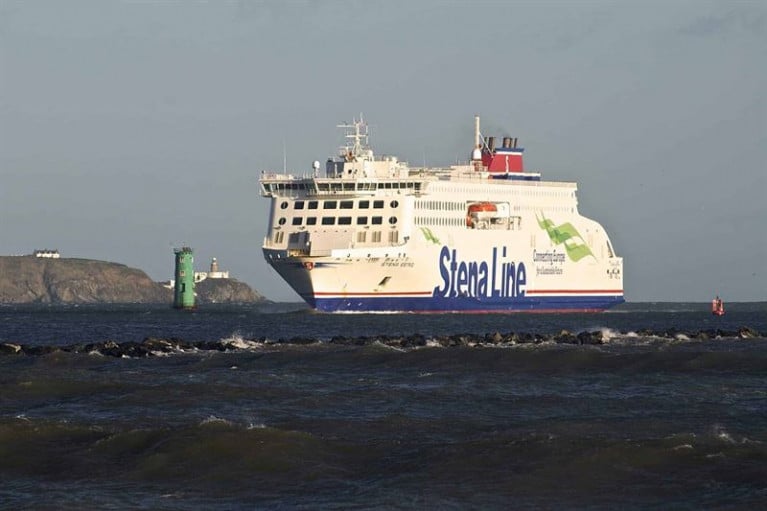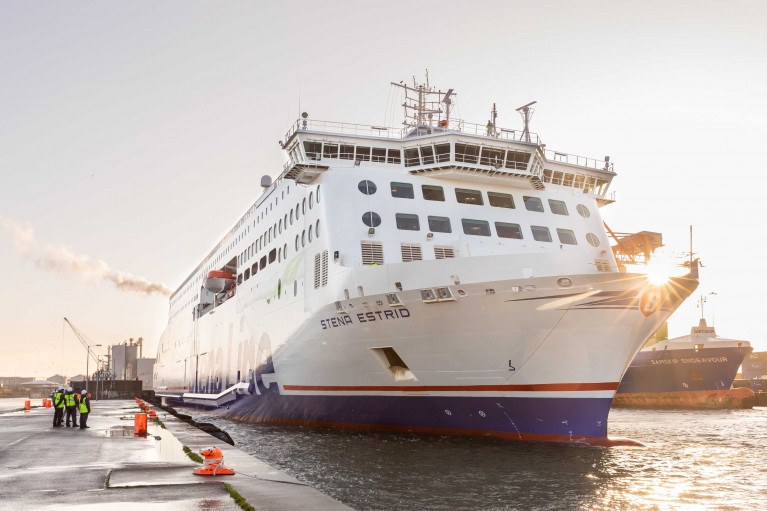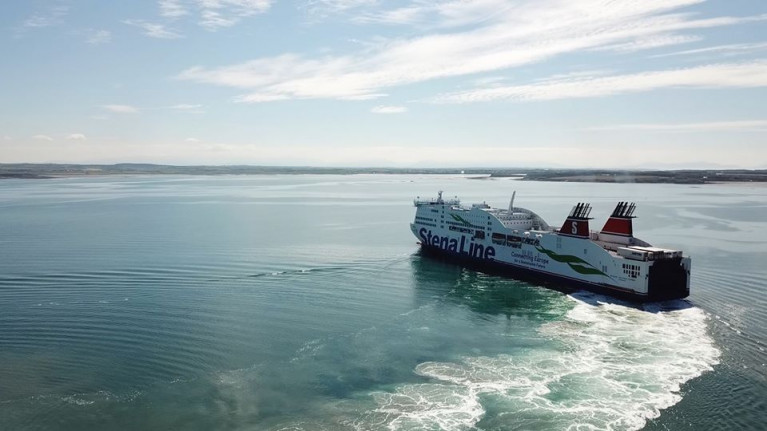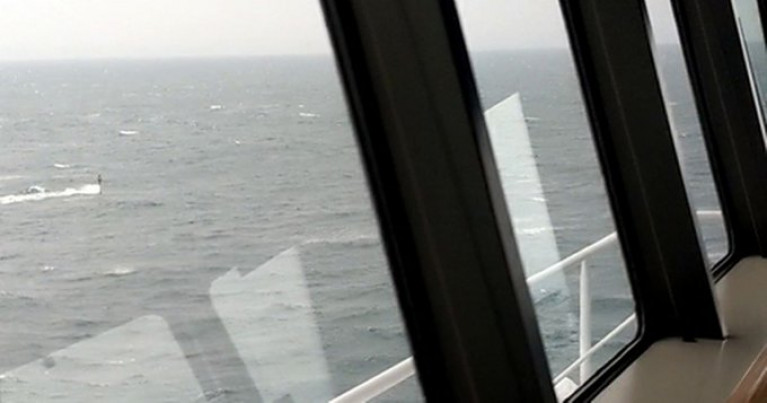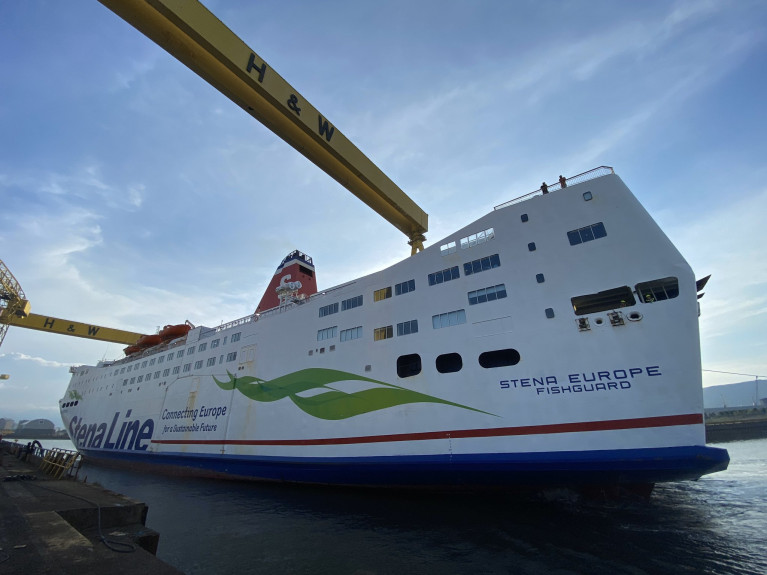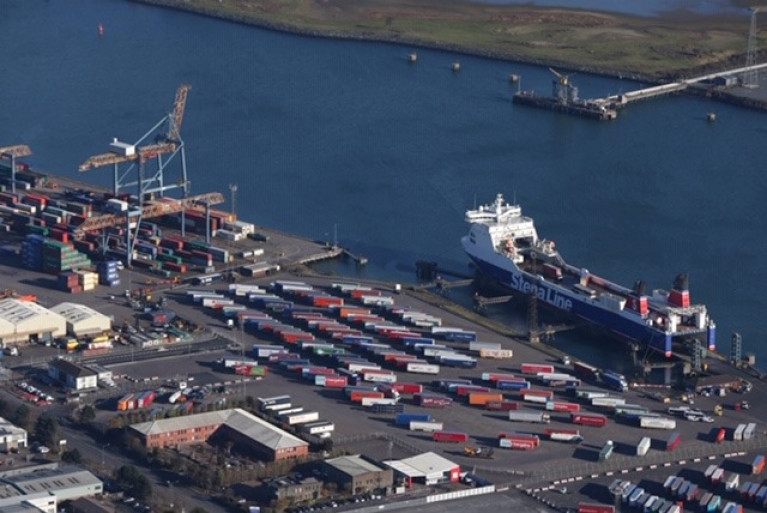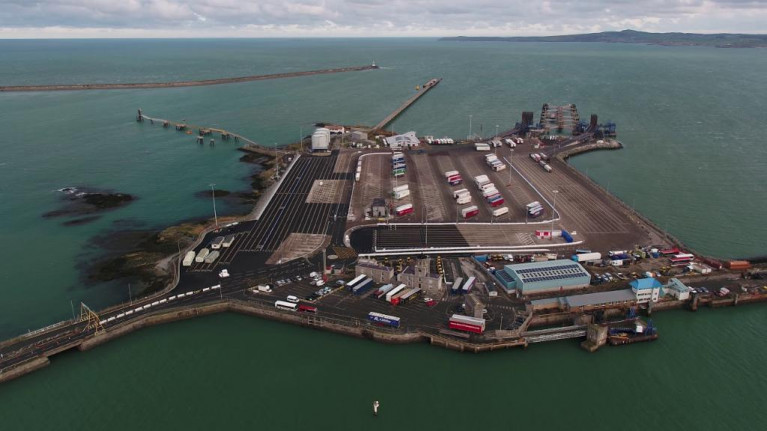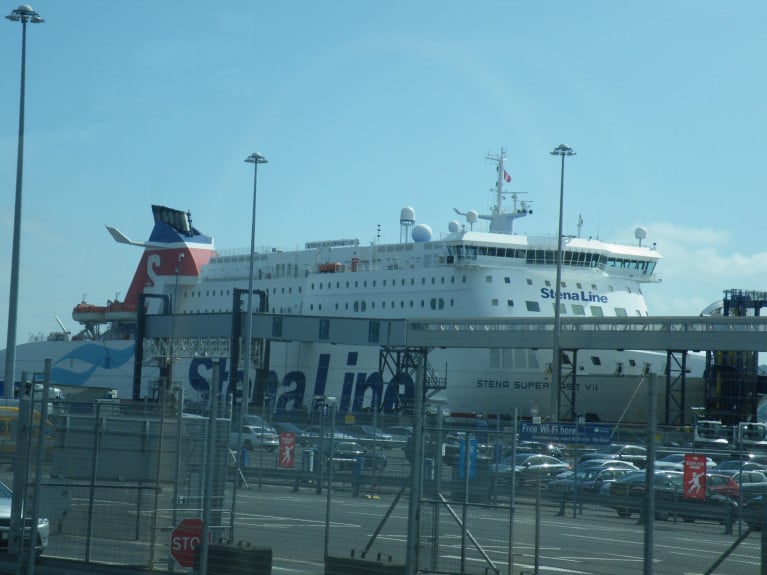Displaying items by tag: Stena Line
Operator Stena Line Furlough Quarter of Dockers at Holyhead Port due to Brexit & Covid Hit
Ferry operator Stena Line has placed a quarter if its dock workers at Holyhead on furlough as Covid and Brexit hit demand for services.
The ferry giant, reports NorthWalesLive, has seen a slump in trade since January 1 due to several factors.
This includes the continued impact of the pandemic on passenger numbers, trade disruption due to Brexit and stockpiling in December.
It has seen some weekend services cancelled and next week Stena Estrid (see related story) will be replaced by the smaller Stena Horizon on the route.
This has sparked fears over the long term impact on Holyhead port with a surge in trade on direct Ireland/EU mainland services and a switch by some operators to direct Belfast routes for goods to and from Northern Ireland.
Port officials remain calm about the situation with confidence that these are short term impacts exacerbated by the pandemic.
But they have taken the decision to temporarily reduce staff numbers dockside with a 25% cut in port services operators.
These workers - who help to dock vessels and the ferries to load and unload - have been placed on the UK Government's Job Retention Scheme.
Further reading here on the reality of such developments.
Ferry Firm Stena Adds New Dublin-Cherbourg Route, As Hauliers Warn of Major Problem
Stena Line is to further increase its freight-ferry capacity direct from Ireland to continental Europe in response to increased post-Brexit demand by adding a new weekend sailing from Dublin to Cherbourg.
The new service, reports RTE News, will start next Saturday and will result in a temporary reduction in weekend capacity on the Dublin to Holyhead route, where demand has dropped dramatically since 1 January.
The new route will use the Stena Estrid, while the Stena Adventurer will continue to operate on the Holyhead route at weekends.
Trade volumes across the Irish Sea are down substantially on normal levels due to new customs procedures and systems that were introduced when the UK became a third country on 1 January.
Hauliers and freight operators have complained of delays in getting goods through customs on both sides of the Irish Sea, due to the challenges.
For much click here including the impact on filling supermarket shelves.
The move by Stena follows that of rivals Irish Ferries, which Afloat reported on the reintroduction last week of W.B.Yeats, but months in advance of a scheduled resumption on the Dublin-Cherbourg route. This development was also in response to a surge in demand from freight hauliers.
Just before lunchtime today, Afloat tracked Stena Embla (sister of the 'Estrid') complete its maiden commercial round trip on the Rosslare-Cherbourg route.
The brand new 'E-Flexer' Ro-Pax ferry was pressed early into service to provide temporary capacity to the French route's existing two-ship service.
The Chinese built ship however is as planned to enter the Belfast-Birkenhead (Liverpool) route joining another sister the Stena Edda.
Operator Stena Line Issue Statement for 'Passenger' Travel
Ferry operator Stena Line has issued an important update for passengers intending to travel on services to the Republic of Ireland and the Netherlands.
Due to new measures imposed by the Irish Government and the Government of the Netherlands, there are restrictions on passenger travel into both countries from the UK.
Republic of Ireland
For at least the next 48 hours from midnight tonight (Sunday 20 Dec), passenger travel is not permitted on our services from the UK into the Republic of Ireland. Except for essential supply chain workers. This affects the operator's Holyhead-Dublin and Fishguard-Rosslare routes.
The Netherlands
Until further notice no passenger travel is allowed from the UK into the Netherlands. This affects our Harwich to Hook of Holland service.
Travel to the UK from the Republic of Ireland and the Netherlands
The above restrictions do not affect travel to the UK from either the Republic of Ireland or Netherlands, which is still permitted for essential reasons in line with government guidance.
Freight
All freight transportation services, including accompanied movements by freight drivers, are unaffected by the above restrictions.
Ferry Firm Stena Marks 25 Years of Dublin-Holyhead Service
Ferry operator Stena Line celebrates today the 25th anniversary of its Dublin Port-Holyhead service – a quarter of a century that has seen the company carry in excess of 12 million passengers, almost 3 million cars and 3.5 million freight units on the route.
In 1995 the company traded as Stena Sealink with the first vessel to sail on the new Ireland-Wales service the Stena Traveller.
The route today is operated by the Stena Adventurer and the recently-built Stena Estrid, the first of three ‘next generation’ ferries commissioned for the Irish Sea, accommodating a mix of freight and leisure traffic.
Over the last 25 years, Stena Line has invested significantly in the Dublin to Holyhead route as volumes have increased significantly both in freight and leisure travel numbers. In fact, if all vehicles that have travelled with the operator to and from Dublin Port were laid end to end, they would circle the entire globe.
“The establishment of our Dublin Port-Holyhead operation 25 years ago today has been something of a game changer for us on the Irish Sea,” said Paul Grant, Stena Line Trade Director (Irish Sea).
“Holyhead has been a strategically important commercial gateway between Britain and Ireland for well over a century. Back in 1995 it was clear that Dublin Port was able to offer Stena Line the future expansion opportunities we required to help develop our business potential in the region, and that vision has now been rewarded.
“Today the service is one of Stena Line’s best performing Irish Sea routes which is why it was chosen to receive the first of the company’s three new build ferries, Stena Estrid, in January of this year. At 215 metres in length with a freight capacity of 3 100 lane meters, Stena Estrid also has the space to carry 120 cars and 1,000 passengers,” he added.
“However, no amount of foresight or planning could have factored in the devastating impact of the Covid 19 pandemic, but I am proud of the key role that Stena Line and my colleagues have played in helping to keep vital food and medical supply lines operational between Ireland and Britain throughout this crisis. We have worked hard to keep our guests and colleagues safe throughout this challenging time and are confident that the ferry industry will be one of the first sectors of the tourism sector to see a return to pre-Covid trading, when it is deemed safe to do so.
“As we move into 2021, Brexit will also provide a challenge for our business as it will for many others. We have been engaging constructively with authorities on both sides of the Irish Sea to ensure the free flow of goods through our ports and are assisting our freight customers as much as we can in their regulatory preparations for Brexit.
“As for the next 25 years, we have set a firm course on becoming the most sustainable global ferry operator, and I’m confident we have the vision and talent to achieve this ambition,” concluded Mr Grant.
Ferry firm Stena has posted major losses for the first six months of the year after the pandemic devastated travel.
Coronavirus has seen passenger numbers slashed and freight reduced on Stena Line's key routes - including those from Holyhead, Liverpool and Heysham to ports in Ireland and Northern Ireland.
Now Stena AB Group has posted figures from the first six months of the year.
The Stena Line ferry operation had losses of –1,014 Swedish Krona (SEK) (Around -£87m) over the period - the bulk of these losses in the first three months of the year.
For further breakdown Business Live has more of the operator's results.
North Channel Stena Line Ferry Had Near Miss with UK Nuclear Submarine, Investigation Finds
In the North Channel a ferry carrying hundreds of passengers narrowly avoided smashing into a British nuclear-powered submarine killing many and sparking a maritime disaster.
A ferry officer, reports BelfastLive, spotted the nuke sub's periscope at the last minute and took action to avoid the collision in the Irish Sea two years ago, an investigation has discovered.
The near-disaster happened in 2018 but the results of a two year probe into what could have been the worst sea disaster to hit the UK in many years was released only last night.
The ferry usually operates between Northern Ireland and Scotland, carrying up to 1300 passengers and 660 cars between Belfast and Cairnyan.
The submarine was on patrol having recently left its base at Faslane, in Scotland.
The crew of the partially submerged Royal Navy nuclear submarine had underestimated the speed of the Stena Superfast V11 vessel.
They had thought they were 1,000 yards from the oncoming ferry and in trying to avoid it, turned towards it. The investigation discovered they were only 250 yards from it.
For further reading into the incident click here.
Ferry Operator Stena Line Supports Local Industry with Multi-Ship Docking Programme at H&W, Belfast
Six ferries of Stena Line's Irish Sea fleet will dry-dock at Harland and Wolff’s famous Belfast shipyard this summer for a range of repairs and upgrades.
Currently the Stena Europe (see related relief ferry), which operates on the Rosslare-Fishguard service, is dry-docked in Belfast with the final works project due to be completed on the Stena Superfast VIII (Belfast-Cairnryan service) at the end of September. This is part of the significant docking programme by the Irish Sea’s largest ferry operator.
2020 marks more than 40 years of Stena ships in Belfast’s iconic Harland and Wolff (H&W) shipyard. In April 1980 the firm’s predecessor (Sealink BR) took delivery of the Belfast-built MV Galloway Princess (later Stena Galloway) which operated on the Northern Ireland routes for many years.
Stena Line continues to select the H&W shipyard for docking works on their Irish Sea ferry fleet, with orders totalling £2.5m.
Paul Grant, Stena Line’s Trade Director said: “Despite the dramatic impact of the Coronavirus pandemic on our business, regular ship upgrades and maintenance works are a very important element in our ship management operation. They help us to maintain our excellent reliability record and keep our Irish Sea fleet to the forefront of the ferry sector.”
He added: “Whilst Stena Line has already committed a significant investment to the Irish Sea by introducing two new ships – Stena Estrid (Dublin-Holyhead, Jan 2020) and Stena Edda (Belfast-Liverpool, March 2020) with a third ship to follow for our Belfast-Liverpool service in early 2021, it’s also important that we continue to improve, develop and invest in our existing fleet of vessels, which is exactly what this contract will do.”
John Petticrew, Managing Director of Harland & Wolff said: “Since InfraStrata acquired the Harland & Wolff shipyard, we have built a strong working relationship with Stena Line, demonstrated through the repeat business we have seen with four ships in the yard since our acquisition.”
Belfast-based Paul Grant is head of the company’s Irish Sea operations. His long career at Stena Line includes a short spell working on the mentioned MV Galloway Princess. “We’re delighted that we are continuing our relationship supporting our local shipyard Harland and Wolff and the other local companies involved. Stena Line continues to support Northern Ireland and have operated throughout the Coronavirus pandemic, ensuring that essential supply lines reach their destinations and enabling the flows of freight and travel customers” he said.
The ferry operator is the largest serving on the Irish Sea, with the biggest fleet offering the widest choice of routes including, combined passenger and freight serviceS: Belfast-Cairnryan, Belfast-Birkenhead (Liverpool), Dublin-Holyhead and Rosslare-Fishguard.
As well as a freight only route, Belfast-Heysham. A total of up to 238 weekly sailing options between Ireland and Britain. Stena Line also offers a direct service linking Rosslare and Cherbourg with three return crossings a week.
Ferry Firm Stena Line Reduces Freight Capacity as Covid-19 Impacts Belfast-Liverpool Volumes
Ferry operator Stena Line has announced that it will be reducing freight capacity on its Belfast - Liverpool (Birkenhead) service due to a decline in freight demand as a consequence of the Coronavirus crisis.
As a result the freight only vessel Stena Forecaster will be removed from service resulting in a reduction of 10 trips per week.
Paul Grant, Stena Line’s Irish Sea Trade Director said: “Since the start of the Coronavirus crisis we have been closely monitoring the market and adapting our capacities to meet the prevailing demand.”
On March 9th, Stena Line launched its largest ship ever on the Belfast – Liverpool route, the brand-new Stena Edda. The newbuild replaced the smaller Stena Lagan and at the time increased capacity for both freight and travel customers.
In early 2021, Stena Line will replace Stena Mersey with a further new ship, Stena Embla. These two new RoPax ferries will increase freight capacity by almost 30% and will double passenger capacity compared with the vessels they replace.
Paul Grant added: “From 2021, a combination of the two largest ships ever to sail between Belfast and Liverpool, Stena Edda and Stena Embla will help us to grow our freight and travel business. Stena Edda and Stena Embla will raise onboard facilities to a whole new level, with 175 cabins including six suites plus enhanced freight facilities and faster loading and disembarkation processes. Despite all of the current difficulties Stena Line remains confident about the future and are well placed to respond to customer and market demands.”
Ferry Jobs at Stena Line Under Threat at Holyhead Port
Ferry operator Stena Line which employs dozens of temporary jobs are set to lost at Holyhead Port, reports NorthWalesLive.
The Swedish owned ferry company announced last month it planned to furlough 600 employees with 150 redundancies across the UK and the Republic of Ireland.
It has emerged 40 will be temporary posts at Holyhead Port, which are set to be axed at the end of the month.
Ynys Mon MS Rhun ap Iorwerth has expressed concerns about the job losses, but a company boss said they were having to make tough decisions.
“This shows the inherent vulnerability of people on temporary or zero hours contracts," said Mr Iorwerth.
For more including a response from Ian Davies, Trade Director, Irish Sea South, Stena Line and his reference to the impact of Ireland currently imposing a 14 self-isolation policy for anyone entering the country, click here
Ferry operator Stena is reducing its Belfast Harbour services as a result of the coronavirus pandemic.
The firm, which normally operates seven ships on 138 sailings a week from Belfast, has temporarily berthed one ship (Afloat tracked to ro-ro freighter Stena Forecaster) and cut sailings to 108 a week.
Earlier this week, the firm said it would furlough staff and make redundancies across its UK and Ireland operations.
Stena sails from Belfast to Heysham, Liverpool and Cairnryan.
It is understood freight volumes have fallen since the crisis began but that non-freight traffic has collapsed.
More on this BBC News story here including what is happening to the ferry sector serving the Republic when yesterday Afloat reported the Irish government approved an “emergency provision” of a maximum of up to €15m (£13.2m).
This is the cost of maintaining five passenger ferry services in response to Covid-19.



























